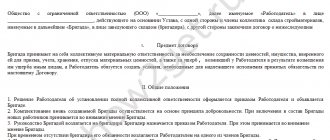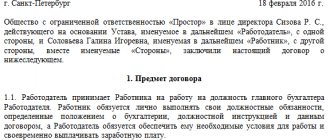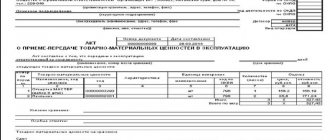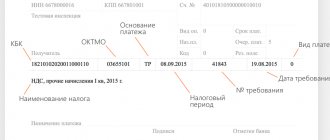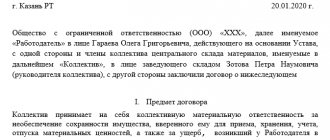Full and partial responsibility
Causing material damage to the property of an organization (individual entrepreneur) may result in financial liability for the guilty employee.
In accordance with current legislation, all company employees bear limited financial liability within the limits of average monthly earnings (Articles 241, 248 of the Labor Code of the Russian Federation). In addition, an agreement on full financial responsibility can be concluded with employees whose work involves the maintenance of material assets. In such a situation, the employee bears full financial responsibility in case of damage to the company (Articles 242, 243 of the Labor Code of the Russian Federation).
You cannot conclude such an agreement with everyone. The list of positions is established by current legislation. Personnel whose positions and professions are not named in the list cannot be assigned full financial responsibility: individual and collective.
In addition to the list of positions, another popular question asked by personnel officers is: list the cases of full financial responsibility.
In a similar manner, an employee is not found guilty if he damaged property using it for necessary self-defense (Article 239 of the Labor Code of the Russian Federation).
Indeed, in what case does full financial responsibility arise? It is better to know these situations in order to be able to quickly respond to them, recovering damages from the culprit.
Current legislation limits the possibility of applying swearing liability. Therefore, an agreement on full financial liability cannot be concluded with all employees of the organization. We list the categories of personnel with whom such an agreement can be signed:
- employees directly servicing goods and materials (money) belonging to the employer;
- the employee's position allows for the conclusion of an agreement on mat responsibility (the List of positions and works was approved by Resolution of the Ministry of Labor of Russia dated December 31, 2002 No. 85);
- employees over 18 years of age.
So, cases of full financial liability include (Article 243 of the Labor Code of the Russian Federation):
- damage caused to the organization (IP) in the performance of labor duties;
- shortage of valuables entrusted to the employee under a contract or a one-time document);
- intentional causing of damage;
- causing damage while under the influence of alcohol, drugs or toxic substances;
- causing damage as a result of criminal actions of an employee established by a court;
- causing damage as a result of an administrative offense;
- disclosure of secrets (state, official, commercial);
- causing damage while the employee was not performing his or her job duties.
If you find an error, please select a piece of text and press Ctrl+Enter.
Cases when PMO is used
An employer or employee does not always know in which cases the employee’s full financial liability arises. Their list is given in Art. 243 Labor Code of the Russian Federation. Additionally, compensation for PMO is mentioned in Part 1 of Art. 277 Labor Code of the Russian Federation. According to it, the employer is also obliged to compensate for direct actual damage that he caused to the enterprise. Based on the employment contract, full financial responsibility can also be assigned to the deputy managers and chief accountant of the enterprise.
In relation to other employees, PMO may be applied when damage was caused:
- intentionally;
- due to the criminal actions of the employee (but his guilt must be proven in court);
- under the influence of alcohol or drugs;
- due to administrative offenses (they must also be established);
- due to disclosure by an employee of secret information;
- not while the employee is performing his job functions;
- due to damage/loss of valuables that were entrusted to the employee (transferred to him for a while or entrusted to him for the entire duration of his service - such a shortage is usually discovered during the inventory).
A separate group includes cases where full financial responsibility is imposed on an employee due to labor legislation or other regulations.
Article 238. Financial liability of an employee for damage caused to the employer
The employee is obliged to compensate the employer for direct actual damage caused to him. Lost income (lost profits) cannot be recovered from the employee.
Direct actual damage is understood as a real decrease in the employer’s available property or deterioration in the condition of said property (including property of third parties located at the employer, if the employer is responsible for the safety of this property), as well as the need for the employer to make costs or excessive payments for the acquisition, restoration of property or compensation for damage caused by the employee to third parties.
(as amended by Federal Law No. 90-FZ of June 30, 2006)
Part three is no longer valid. — Federal Law of June 30, 2006 N 90-FZ.
Concept and types of financial liability.
⇐ PreviousPage 2 of 12Next ⇒The concept and features of financial liability under labor law
One of the types of liability in labor law is financial liability, the subjects of which can be the employee and the employer. An employee's financial liability is one of the means of protecting property and represents the legal obligation of the employee to compensate for the damage caused by him. An employment contract or written agreements attached to it may specify the financial liability of the parties to this contract. The contractual liability of the employer to the employee cannot be lower, and the employee to the employer - higher, than provided for by the Labor Code or other federal laws (Article 232 of the Labor Code). Financial liability of the parties to an employment contract arises for damage caused by one party to the other as a result of culpable unlawful behavior (action or inaction), unless otherwise provided by the Labor Code or other federal laws. Each party to the employment contract is obliged to prove the amount of damage caused to it.
In addition to holding the employee financially liable, the employer has the right to simultaneously apply disciplinary measures against him and deprive him of the right to receive bonus payments.
Labor legislation provides for both individual and collective financial responsibility of workers.
By regulating compensation for material damage, labor legislation (Articles 238 – 250 of the Labor Code) pursues the following goals:
a) full or partial compensation for damage;
b) providing educational and disciplinary influence on both the employee and the team;
c) protection of employee wages from illegal deductions.
An employee, with the consent of the employer, may voluntarily compensate for the damage caused to the employer in full or in part, transfer equivalent property to compensate for the damage, or repair the damaged property.
Labor legislation establishes the conditions for the occurrence of material liability, which include:
a) The presence of direct actual damage (Article 238 of the Labor Code). Direct actual damage is a real decrease in the employer's available property or deterioration in the condition of said property (including property of third parties located at the employer, if the employer is responsible for the safety of this property), as well as the need for the employer to make costs or unnecessary payments for the acquisition or restoration of property (Article 238 of the Labor Code).
The exception is cases (Article 277 of the Labor Code) when the calculation of losses is carried out in accordance with the rules provided for by civil law, i.e. taking into account lost income, if the damage was caused by unlawful actions of the head of the organization;
b) Illegal behavior of an employee - failure to fulfill labor duties established by law, internal labor regulations, orders and instructions (written) of the employer. Damage resulting from force majeure, normal economic risk, extreme necessity or necessary defense, as well as the employer’s failure to provide proper conditions for storing property entrusted to the employee (Article 239 of the Labor Code) cannot be assigned to the employee.
c) The employee’s guilt in causing the damage. Guilt expresses a person’s mental attitude towards the unlawful act he commits and the result caused by it. The legislation provides for two forms of guilt: intent (direct or indirect), negligence (frivolity or negligence).
The burden of proving the employee's guilt lies with the employer.
d) There is a causal connection between the employee’s act and the actual damage. The employer is obliged to establish as a result of whose specific actions (inaction) the material damage was caused or the degree of participation of each guilty employee.
Thus, financial liability is the legal obligation of an employee to compensate, within the limits and procedure established by labor legislation, direct actual damage caused by his guilty unlawful act to the employer’s property.
Types of financial liability
Labor legislation provides for two types of liability: full and limited.
Full financial liability is an exception to the general rule of applying financial liability and can be applied in cases directly provided for by federal legislation.
The limitation of liability is related to wages - the amount of the employee’s average monthly earnings (Article 241 of the Labor Code) on the day the damage was discovered, based on the last 12 months. Limited financial liability is recognized by labor legislation as the main type of financial liability.
Labor legislation determines cases of full financial liability of an employee, which are influenced by the peculiarities of labor duties, the specifics of work and other characteristics. The conditions for full financial liability are:
In accordance with the law and labor duties, the employee is entrusted with financial responsibility in full (Article 243 of the Labor Code).
1. In case of a shortage of valuables entrusted to the employee on the basis of a special written agreement in connection with the specifics of the work performed or their receipt under a one-time document (Articles 243, 244, 245 of the Labor Code). In this case, the employee’s liability may arise if the following conditions are met: 1) reaching the age of 18; 2) occupying a position or performing work specified in a special list; 3) in the presence of a written agreement.
An agreement on full financial liability can be concluded only with employees who are directly related to the storage, processing, sale (vacation), transportation or use in the production process of material assets belonging to the employer. The agreement on full financial responsibility will be additional to the employment contract. In its absence, the employee’s full financial liability cannot take place.
The employee’s full financial liability also arises for the shortage of valuables received by the employee under one-time documents (power of attorney), when he is engaged for urgent receipt, delivery, or transfer of material assets.
2. Intentional infliction of damage (Article 243). The employer must prove that the employee intentionally caused damage. Otherwise, full financial liability of the employee is not allowed.
3. Causing damage while under the influence of alcohol, drugs or toxic substances (Article 243 of the Labor Code). In this case, the form of guilt, as well as the specialty or profession of the employee, does not matter. The state of intoxication must be documented, i.e., a corresponding certificate from a medical institution. If the employee refuses to be examined, then the fact of intoxication can be confirmed by witness testimony and the timely drawing up of a report at the place of work about the employee being in such a state.
4. Causing damage as a result of criminal actions established by a court verdict (Article 243 of the Labor Code). The legislator emphasizes that it is necessary to have not only the very fact of initiating a criminal case, but also a court verdict, where the criminal nature of the employee’s actions will be proven. The release of an employee from criminal punishment under an amnesty act does not free him from full financial responsibility, since a court verdict has established the criminal nature of his actions. In cases of termination of a criminal case at the stage of preliminary investigation, as well as in cases of acquittal, full financial liability is not allowed.
5. Causing damage as a result of an administrative violation established by a government body (Article 243 of the Labor Code). An administrative offense is an unlawful, guilty action (inaction) of an individual or legal entity, for which the Code of the Russian Federation on Administrative Offenses or the laws of the constituent entities of the Russian Federation provides for administrative liability. In this case, the employer will have the right to hold employees financially liable in full in the event of a court decision or a decision by the federal labor inspection body.
6. There was a disclosure of information constituting a state or other secret protected by law (Article 243 of the Labor Code). An employment contract (Article 57 of the Labor Code) may provide for conditions on non-disclosure of secrets protected by law (state, official, commercial and other).
7. The damage was not caused while the employee was performing his job duties (Article 243 of the Labor Code). The employer must prove that the employee was not performing his job duties at the time the damage was caused and his behavior was contrary to the interests of the employer.
Concept and procedure for determining the amount of damage
Current labor legislation provides for the possibility of compensation for damage caused to the employer in several ways. This could be: 1) voluntary compensation for damage by the employee himself; 2) compensation for damage by order (order) of the employer; 3) compensation for damage in court.
Determining the amount of damage caused can be done in two ways - in general and in a special manner.
The general procedure provides for two ways to determine the amount of damage: 1) based on actual losses based on market prices prevailing in the area on the day the damage was caused; 2) based on the value of the property according to accounting data, taking into account the degree of depreciation of this property. Obviously, the second method will be applied in the case when, taking into account market prices, the amount of damage turns out to be lower than the value of the property according to accounting data. Accounting is an orderly system of collecting, registering and summarizing information in monetary terms about the property, obligations of organizations and their movement through continuous, continuous and documentary accounting of all business transactions. The objects of accounting are the property of organizations, their obligations and business transactions carried out by organizations in the course of their activities. When using accounting data, the amount of damage is documented.
A special procedure applies in cases where:
1) damage to the employer was caused by theft, intentional damage, shortage or loss of certain types of property and other valuables;
2) the actual amount of damage caused exceeds its nominal amount.
3. Financial liability of the employer to the employee
Labor legislation protects the interests of workers equally as well as employers in the area of financial liability. The head of the organization bears full financial responsibility to the employee and the organization, regardless of whether an entry about it is included in his employment contract or not.
In the legal literature, there are three groups of cases of the employer’s financial liability to the employee, depending on the violation of the employee’s labor rights:
1. compensation for property damage resulting from the employer’s violation of the employee’s right to work.
2. compensation for harm resulting from a violation of the employee’s right to health protection, healthy and safe working conditions in connection with causing him a work injury or occupational disease.
3. compensation to the employee for damage resulting from the employer’s violation of other rights of the employee in the employment relationship, for example, the right to protect his personal property, due to failure to ensure the safety of the employee’s personal belongings during work.
The employer bears financial liability to the employee, which is of a property nature (Chapter 38 of the Labor Code) in the following cases:
a) Illegal deprivation of an employee’s opportunity to work (Article 234 of the Labor Code), if the employee’s earnings were not received as a result of:
illegal removal of an employee from work, his dismissal or transfer to another job;
non-fulfillment or untimely execution by the employer of the decision of the labor dispute resolution body on the reinstatement of the employee to his previous job;
delays in issuing a work book, entering into it an incorrect or non-compliant formulation of the reason for the employee’s dismissal;
invited by transfer from another employer, as well as in cases of untimely conclusion of an employment contract due to the fault of the employer. If, as a result of refusal or untimely conclusion of an employment contract, an employee has forced absenteeism, then the employer is obliged to compensate him for material damage in relation to the rules that are established for paying for forced absenteeism of an illegally dismissed person;
other cases of violation by the employer of labor legislation.
b) Causing damage to the employee’s property by the employer (Article 235 of the Labor Code). The employee’s application for compensation for damage is sent by him to the employer, who is obliged to consider this application and the corresponding decision within ten days from the date of its receipt. If the employee does not agree with the employer’s decision or has not received a response within the prescribed period, the employee has the right to file a claim in court. If the employee agrees, damages may be compensated in kind.
c) Delays in paying wages to an employee (Article 236 of the Labor Code). This provision is new to Russian labor legislation. Violation of the deadline for the payment of wages, vacation pay, dismissal payments and other payments due to the employee entails the employer’s obligation to pay (in addition to these payments) monetary compensation (interest) in an amount not lower than the rate of 1/300 of the refinancing rate of the Central Bank of the Russian Federation in force at that time amounts paid on time for each day of delay after the established payment deadline.
d) Compensation for moral damage caused to the employee (Article 237 of the Labor Code). This basis for the employer’s financial liability is also new for Russian labor legislation. When determining the amount of compensation for moral damage, the court takes into account the degree of guilt of the offender and other noteworthy circumstances, takes into account the degree of physical and moral suffering associated with the individual characteristics of the person who suffered harm (see Part 2 of Article 151 of the Civil Code).
In the event of a dispute, the fact of causing moral damage to the employee and the amount of compensation for it are determined by the court, regardless of the property damage subject to compensation.
Question 5.
⇐ Previous2Next ⇒
Article 240. The employer’s right to refuse to recover damages from an employee
The employer has the right, taking into account the specific circumstances in which the damage was caused, to fully or partially refuse to recover it from the guilty employee. The owner of the organization's property may limit the specified right of the employer in cases provided for by federal laws, other regulatory legal acts of the Russian Federation, laws and other regulatory legal acts of the constituent entities of the Russian Federation, regulatory legal acts of local government bodies, and the constituent documents of the organization.
(as amended by Federal Law No. 90-FZ of June 30, 2006)
Article 242. Full financial liability of the employee
The employee’s full financial liability consists of his obligation to compensate the direct actual damage caused to the employer in full.
(as amended by Federal Law No. 90-FZ of June 30, 2006)
Financial liability in the full amount of damage caused may be assigned to the employee only in cases provided for by this Code or other federal laws.
Employees under the age of eighteen bear full financial liability only for intentional damage, for damage caused while under the influence of alcohol, drugs or other toxic substances, as well as for damage caused as a result of a crime or administrative violation.
(as amended by Federal Law No. 90-FZ of June 30, 2006)
Article 243. Cases of full financial liability
Financial liability in the full amount of damage caused is assigned to the employee in the following cases:
1) when, in accordance with this Code or other federal laws, the employee is held financially liable in full for damage caused to the employer during the performance of the employee’s job duties;
2) shortage of valuables entrusted to him on the basis of a special written agreement or received by him under a one-time document;
3) intentional infliction of damage;
4) causing damage while under the influence of alcohol, drugs or other toxic substances;
(as amended by Federal Law No. 90-FZ of June 30, 2006)
5) damage caused as a result of the employee’s criminal actions established by a court verdict;
6) damage caused as a result of an administrative violation, if established by the relevant government body;
7) disclosure of information constituting a secret protected by law (state, official, commercial or other), in cases provided for by federal laws;
(as amended by Federal Law No. 90-FZ of June 30, 2006)
 causing damage not while the employee was performing his job duties.
causing damage not while the employee was performing his job duties.
Financial liability in the full amount of damage caused to the employer can be established by an employment contract concluded with the deputy heads of the organization and the chief accountant.
(as amended by Federal Law No. 90-FZ of June 30, 2006)
Procedure for compensation for full material damage
It is established by law that the text of an agreement on liability must necessarily contain information regarding the specific procedure for compensation for damage. Here everything will depend on the terms of the agreement, as well as the characteristics of the material value that was damaged.
In accordance with the requirements of the legal system, the procedure for compensation for an employee may be as follows:
- provision of similar property to replace lost property;
- payment for repair work if, as a result of a negligent attitude to official duties, the employee’s actions led to a decrease in the potential value and a decrease in its value;
- monetary compensation for damage caused, which will be commensurate with the real assessment of material damage. It is worth noting that the payment of compensation can be a one-time payment (the employee repays his debt in full) or proportional (the employee will transfer a specific amount to the employer every month until he pays off the amount of damage).
In a situation where an employee does not agree with his guilt or the specific amount of damage in monetary terms, he has the right to apply to the courts to protect his interests.
Article 244. Written agreements on the full financial responsibility of employees
Written agreements on full individual or collective (team) financial liability (clause 2 of part one of Article 243 of this Code), that is, on compensation to the employer for damage caused in full for the shortage of property entrusted to employees, can be concluded with employees who have reached the age of eighteen years and directly servicing or using monetary, commodity values or other property.
(as amended by Federal Law No. 90-FZ of June 30, 2006)
Lists of works and categories of workers with whom these contracts can be concluded, as well as standard forms of these contracts, are approved in the manner established by the Government of the Russian Federation.
How to conclude an agreement on full financial responsibility
Agreements are concluded in writing using the standard forms established in the list.
If a position or work is indicated in the list, there is a clause in the employment contract or a reference to the fact that the position is on the list, and the employee refuses to enter into an agreement on full financial responsibility, such refusal is considered as a failure to fulfill labor duties with the application of disciplinary measures. And what an employee’s financial responsibility is and that the fulfillment of job duties is accompanied by the conclusion of an agreement on full financial responsibility, he must be told at the stage of hiring.
There may be situations when such an agreement must be concluded with a working citizen. For example, the law changed, and the position or work of an employee was included in the list. In this situation, the employer offers the person to transfer to another job (Article 74 of the Labor Code of the Russian Federation). If there is no other job or the employee refuses the proposed option, the employment contract with him is terminated (clause 7, clause 1, article 77 of the Labor Code of the Russian Federation).
Article 245. Collective (team) financial liability for damage
When employees jointly perform certain types of work related to the storage, processing, sale (release), transportation, use or other use of valuables transferred to them, when it is impossible to differentiate the responsibility of each employee for causing damage and to conclude an agreement with him on compensation for damage in full, collective (team) financial liability may be introduced.
A written agreement on collective (team) financial liability for damage is concluded between the employer and all members of the team (team).
Under an agreement on collective (team) liability, valuables are entrusted to a predetermined group of persons, who are assigned full financial responsibility for their shortage. To be released from financial liability, a member of a team (team) must prove the absence of his guilt.
In case of voluntary compensation for damage, the degree of guilt of each member of the team (team) is determined by agreement between all members of the team (team) and the employer. When recovering damages in court, the degree of guilt of each member of the team (team) is determined by the court.
Full financial responsibility: list of positions
It is permissible to impose full financial responsibility on the staff if this is provided for by the law on the financial responsibility of the employee - the Labor Code of the Russian Federation, federal laws, Resolution No. 85 of the Ministry of Labor and Social Development of the Russian Federation of December 31, 2002. The latter contains a list of jobs and positions, on the basis of which the employer has the right to enter into agreements on the personal financial responsibility of the employee. Among those with whom such agreements are concluded are managers, accountants, cashiers, collectors, forwarders, storekeepers and other workers whose activities involve the storage or transportation of money and valuables.
Article 246. Determination of the amount of damage caused
The amount of damage caused to the employer in the event of loss and damage to property is determined by actual losses, calculated on the basis of market prices prevailing in the area on the day the damage was caused, but not lower than the value of the property according to accounting data, taking into account the degree of depreciation of this property.
Federal law may establish a special procedure for determining the amount of damage subject to compensation caused to an employer by theft, intentional damage, shortage or loss of certain types of property and other valuables, as well as in cases where the actual amount of damage caused exceeds its nominal amount.
Article 248. Procedure for recovery of damages
Recovery from the guilty employee of the amount of damage caused, not exceeding the average monthly earnings, is carried out by order of the employer. The order can be made no later than one month from the date of final determination by the employer of the amount of damage caused by the employee.
If the month period has expired or the employee does not agree to voluntarily compensate for the damage caused to the employer, and the amount of damage caused to be recovered from the employee exceeds his average monthly earnings, then recovery can only be carried out by the court.
(as amended by Federal Law No. 90-FZ of June 30, 2006)
If the employer fails to comply with the established procedure for collecting damages, the employee has the right to appeal the employer’s actions in court.
An employee who is guilty of causing damage to the employer may voluntarily compensate for it in whole or in part. By agreement of the parties to the employment contract, compensation for damage by installments is allowed. In this case, the employee submits to the employer a written obligation to compensate for damages, indicating specific payment terms. In the event of dismissal of an employee who gave a written commitment to voluntarily compensate for damage, but refused to compensate for the specified damage, the outstanding debt is collected in court.
With the consent of the employer, the employee may transfer equivalent property to compensate for the damage caused or repair the damaged property.
Compensation for damages is made regardless of whether the employee is brought to disciplinary, administrative or criminal liability for actions or inactions that caused damage to the employer.
Chapter 37. General provisions
Article 232. Obligation of a party to an employment contract to compensate for damage caused by it to the other party to this contract
The party to the employment contract (employer or employee) who caused damage to the other party shall compensate for this damage in accordance with this Code and other federal laws.
An employment contract or written agreements attached to it may specify the financial liability of the parties to this contract. At the same time, the contractual liability of the employer to the employee cannot be lower, and the employee to the employer – higher, than is provided for by this Code or other federal laws.
https://youtu.be/4fSbnySDl_g
Termination of an employment contract after damage has been caused does not entail the release of the party to this contract from financial liability provided for by this Code or other federal laws.
Article 233. Conditions for the onset of financial liability of a party to an employment contract
The financial liability of a party to an employment contract arises for damage caused by it to the other party to this contract as a result of its culpable unlawful behavior (actions or inaction), unless otherwise provided by this Code or other federal laws.
Each party to the employment contract is obliged to prove the amount of damage caused to it.
Compensation for damages is made regardless of whether the employee is brought to disciplinary, administrative or criminal liability for actions or inactions that caused damage to the employer.
Article 249. Reimbursement of costs associated with employee training
In the event of dismissal without good reason before the expiration of the period stipulated by the employment contract or agreement on training at the expense of the employer, the employee is obliged to reimburse the costs incurred by the employer for his training, calculated in proportion to the time actually not worked after completion of training, unless otherwise provided by the employment contract or training agreement.
Article 250. Reduction by the labor dispute resolution body of the amount of damage to be recovered from the employee
The labor dispute resolution body may, taking into account the degree and form of guilt, the financial situation of the employee and other circumstances, reduce the amount of damage to be recovered from the employee.
The amount of damage to be recovered from the employee is not reduced if the damage was caused by a crime committed for personal gain.
The legislation determines that the victim may not make a claim to the other party when, for example, the damage is not significant for him (Article 240 of the Labor Code of the Russian Federation). In this case, liability does not arise.
Thus, the conditions for the occurrence of financial liability are:
- the presence of a labor offense, expressed in culpable illegal behavior;
- damage to the property of one of the parties (or third parties), costs or payments for the acquisition, restoration of property or compensation for damage (including damage to third parties) by the other party as a result of these unlawful acts;
- the injured party’s exercise of its right to demand compensation for damage caused.
It is important to remember about the circumstances that exclude the employee’s financial liability. These include causing damage due to force majeure circumstances, economic risk, extreme necessity, necessary defense, failure by the organization to fulfill the obligation to provide conditions for storing property entrusted to the employee.
The following types of employee liability are distinguished:
- Full. The employee is obliged to fully compensate for the damage caused to him.
- Collective. It is used in cases where, due to the equal distribution of responsibilities between all members of the work team, it is not possible to apply it to one person.
Cases of full financial liability of an employee include:
- imposing full financial responsibility on the employee (only adult employees);
- establishing a shortage of valuables entrusted to the employee;
- presence of intent;
- committing an offense while under the influence of alcohol or other intoxication;
- criminal acts established in court;
- disclosure of secrets (commercial, state, etc.);
- administrative violation;
- causing harm while the employee was not performing his or her official duties.
Limited - regulated by Art. 241 of the Labor Code of the Russian Federation and makes up the majority of cases. It is expressed in causing harm during the performance of work duties due to negligence or negligence.
The employee’s financial liability for damage caused to the employer is within the limits of the average monthly earnings of the perpetrator. This type also applies to minors on a general basis.
We invite you to read: A person has not lived in an apartment for six months; discharge him
Occurs in any case of causing losses if the action (inaction) of the employee does not fall under full financial liability.
Examples include the following cases:
- damage to valuables entrusted for the performance of work duties due to inattention or negligence;
- loss of important documents, the absence of which causes direct actual damage for the employer;
- improper preparation or failure to draw up documents, which led to the inability of the organization to carry out its activities in full;
- expenses for repairing damaged property;
- payment for periods of forced downtime or absenteeism;
- loss of earnings due to the organization due to negligent performance of duties.
To apply it, you must initially conclude an appropriate written agreement with team members.
This type of financial liability arises when some work on storage, sale, transportation, and use of transferred material assets is performed by a team, if it is impossible to divide it into individual members of the team and conclude an agreement with each of them on compensation in full (for example, a warehouse).
To recover damages, it is first necessary to establish the employee’s guilt. To do this, you need to draw up an inspection report and reflect the amount of losses in it. Based on the protocol, an act is drawn up, the real monetary value of the damage caused is assessed, confirmed by accounting documents.
Having established the amount, we check what type of financial liability the guilty person falls under. If it does not fall under full (the position is not the same and there is no contract), therefore, losses are compensated within the limits of average earnings, which are determined on the day the damage is established. And it is carried out according to the rules of Art.
139 Labor Code of the Russian Federation.
To make deductions from earnings, it is necessary to issue an appropriate order, with which he must be familiarized. In some cases, the guilty person agrees to voluntarily compensate for the harm caused.
In accordance with Art. 243 of the Labor Code of the Russian Federation, the condition of full financial responsibility can be established by the terms of a properly executed employment contract with the manager or his deputies, the chief accountant. Since these categories are endowed with extensive powers and manage material assets, they must bear responsibility, including material responsibility. Also by virtue of Art. 277 of the Labor Code of the Russian Federation, the manager is obliged to fully compensate the organization for losses caused.
https://youtu.be/60e2LTHjpFE
When hiring, a contract is drawn up. This doesn't apply to every worker, but positions such as salesperson or cashier come with financial responsibilities.
The document comes into force after it is signed by the parties and contains a clear description of the obligations of the parties and their rights, possible methods of collecting damages and other necessary conditions.
Of course, such actions by the employer are dictated, first of all, by the desire to protect their property. But how legitimate is such a requirement considered and who from the organization’s staff can be subject to full financial liability?
Cases of full financial liability
Cases of full financial liability of an employee to the employer established by the Labor Code of the Russian Federation.
An employee’s financial liability is a special type of liability, which consists in the employee’s obligation to compensate for the damage that he caused to the employer as a result of violation of his labor duties.
There are two types of employee liability:
- limited financial liability;
- full financial responsibility.
Cases of full financial liability, when an employee compensates direct actual damage caused to the employer in full, are established by Article 243 of the Labor Code of the Russian Federation. This list of cases is closed and is not subject to expanded interpretation.
Circumstances under which limited liability arises
Financial liability is the obligation of one of the parties to an employment contract to bear responsibility for the damage caused to the other party as a result of unlawful behavior.
These may be actions or inaction, but the guilt of the person must be established. There are 2 types of financial liability - full and limited. According to Art. 241 of the Labor Code of the Russian Federation, the limited financial liability of an employee is the obligation to compensate the employer for direct actual damage caused to him, but not higher than the maximum limit established by law, which is determined in accordance with the amount of salary (read about the recovery of material damage by the employer from the employee here). This maximum limit is the average monthly salary of the at-fault employee.
https://youtu.be/75PjBrirwyE
The concept of full financial responsibility is described in Art. 242 Labor Code of the Russian Federation. It is the employee’s obligation to compensate the employer for the direct actual damage caused to him in full.
- Partial financial responsibility of an employee begins at the age of 14, and full - only from the age of majority.
- An employee can be held financially liable in full only if he has signed a special agreement with the director, his deputy or accountant. The obligation to bear limited liability is implied in a standard employment contract.
- Only employees holding certain positions that involve transactions with money and valuables are fully financially obligated. All employees have limited financial responsibility, regardless of whether they have contact with money and valuables.
A prerequisite for bringing an employee to any type of financial liability is work under an employment contract. If it is not concluded, the employer has no legal grounds to force the employee to compensate him for the damage caused. In this case, the employer himself will be responsible for the failure to register the employee - details here.

